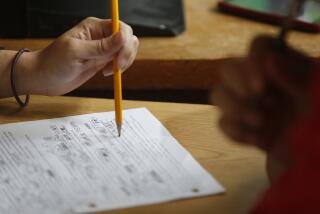Study of memory brings researchers closer to mind reading
- Share via
How does the formidable human brain organize its memories? A new study used electrical activity of the brain to investigate. The resulting report shows that when people think of words that are linked by their meanings -- “apple” and “orange,” for example -- the brain often exhibits similar patterns of activity.
There’s a futuristic, Big Brother-ish dimension to the work: The authors argue that down the road, their results might be useful in mind-reading approaches that rely on connecting measurements of brain activity to what a person is thinking.
Scientists have long known that when people recall an item such as a hammer it brings up memories of related things, such as screwdrivers or nails. But little has been known about how the brain actually links the words together.
In the new report, published online this week in the Journal of Neuroscience, researchers at the University of Pennsylvania tried to address this question by using electrodes implanted under subjects’ skulls and on top of their brains (the electrodes were put there primarily to study epilepsy, which all the participants had). The scientists recorded the activity of the subjects’ neurons while they remembered a set of words they had been taught a few minutes earlier.
The subjects were asked to say the words out loud as they remembered them, so the scientists were able to identify when each person was remembering each word.
The neuroscientists found, as expected, that remembering similar words led to similar patterns of brain activity in areas connected to language processing. But they did not find such a pattern when they looked at the hippocampus, the area most strongly linked to memory, in all of their participants.
Instead, they found that only some people had activity in the hippocampus that would indicate how similar words were. These were people who also tended to cluster similar words together during recall, listing words like “apple” and “banana” one after another. Other subjects who did not cluster such words together -- who would be as likely to list “hammer” after “apple” as after “screwdriver” -- lacked that organized activity in their hippocampus.
The results, the authors write, support the idea that the hippocampus is responsible for organizing and retrieving information, but not for actually storing it.
The application to future mind-reading? Such technologies remain years and maybe decades away, the authors note. But they say their study shows that the brain does carry signatures of how words and categories of words are stored and remembered, just waiting to be uncovered.
Past studies have tried to connect brain activity to thought when people see pictures of or hear audio recordings of words. But the authors say their analysis was much less artificial than that -- it looked at brain activity that occurred when people were simply remembering things, as they naturally do in normal life. That, they say, is far closer to the situation you’d encounter if you really wanted to read a person’s mind.
Recently, Stanford Law School’s Center for Law and the Biosciences hosted a discussion by UC Berkeley’s Jack Gallant of another method of using brain imaging to read minds. The talk was recorded and posted online.





